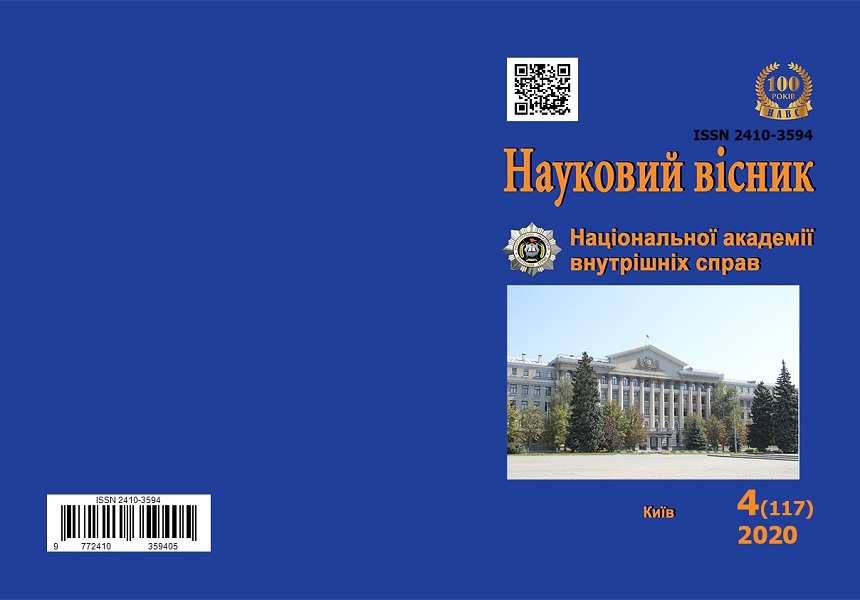Methodological Bases of Legal Advisory Activity Research
Abstract
The purpose of the article is to determine the methodological principles of research of legal advisory activity, to substantiate the necessity of their use for disclosure of theoretical bases, cognition of essence, content and specific features of professional activity of legal advisor. The methodological basis of the article is a set of philosophical and worldview, general scientific and specific scientific methods, in particular: dialectical, hermeneutic, systemic, formal-logical, as well as an operational approach. The scientific novelty consists in improvement of the methodological foundations of legal advisory activities study. The article substantiates the need to use the operational approach in the process of studying the professional activity of a legal advisor, which is explained by its legal nature; the methods of scientific cognition, which form the methodological basis of the complex research of legal advisory activity, are singled out, which as a result will provide an opportunity to formulate substantiated and practically significant conclusions. Conclusions. Carrying out a theoretical and legal study of legal advisory activity provides application of complex and effective methodology which combines approaches, general scientific and specific scientific methods of cognition the choice of which is due to the peculiarities of the subject of study. The issue of determining the methodological basis of scientific research is given special attention by the scientist, since its objectivity and reliability depend on a well-chosen methodology, as well as the validity of the conclusions formulated and their scientific value and practical significance.
Keywords: method; methodology; scientific research; scientific cognition; scientific approach; cognitive process; professional activity of a legal advisor; legal advisory activity.
Downloads
References
Антонюк Н. О. Методологічні засади дослідження диференціації кримінальної відповідальності. Питання боротьби зі злочинністю. 2019. № 38. С. 9–22. doi: 10.31359/2079 6242 2019 38 9.
Ховпун О. С. Значення герменевтичного методу адміністративно-правового забезпечення фармації. Вісник Луганського державного університету внутрішніх справ ім. Е. О. Дідоренка. 2020. № 2 (90). С. 69–76. doi: 10.33766/2524-0323.90.69-76.
Коломієць П. В. Проблематика методології дослідження правового регулювання правового регулювання податкової безпеки України: концептуальні особливості. Підприємництво, господарство і право. 2020. № 8. С. 191–195. doi: https://doi.org/10.32849/2663-5313/2020.8.31.
Копча В. В. Методологія дослідження правового явища: поняття, структура, інструментарій. Часопис Київського університету права. 2020. № 1. С. 54–58. doi: 10.36695/2219-5521.1.2020.08.
Костицький М. В. Деякі питання методології юридичної науки. Науковий вісник Національної академії внутрішніх справ. 2013. № 1. С. 3–11. URL: http://109.237.87.242/bitstream/123456789/3056/1/2013_1_kostytskyi.pdf.
Мічурін Є. О. Методологія науки цивільного права. Вісник Харківського національного університету імені В. Н. Каразіна. 2019. № 28. С. 60–65. doi: 10.26565/2075-1834-2019-28-07.
Процевський В. О. Щодо методологічних засад вивчення правових дисциплін. Збірник наукових праць Харківського національного педагогічного університету імені Г. С. Сковороди. 2017. № 27. С. 5–12. (Серія «Право»). doi: https://doi.org/10.5281/zenodo.1171299.
Садовнік В. П. Структурованість системи наукового пізнання. Прикарпатський юридичний вісник. 2019. № 3 (28). С. 66–69. doi: https://doi.org/10.32837/pyuv.v1i3(28).321.
Шахов С. В. Значення герменевтичного методу адміністративно-правового забезпечення фармації. Науковий вісник Міжнародного гуманітарного університету. 2019. № 38. С. 41–44. doi: https://doi.org/10.32841/2307-1745.2019.38.10.
Тихомиров Д. О. Структура методології досліджень державної політики у сфері безпеки. Філософські та методологічні проблеми права. 2019. № 2 (18). С. 46–51. doi: https://doi.org/10.33270/02191802.46.
Тихомиров Д. О. Наукові методологічні підходи під час дослідження державної політики у сфері безпеки. Підприємництво, господарство і право. 2020. № 3. С. 230–234. doi: https://doi.org/10.32849/2663-5313/2020.3.39.
Abstract views: 135 PDF Downloads: 99
- Authors reserve the right to authorship of their own work and transfer to the magazine the right of the first publication of this work under the terms of the Creative Commons Attribution License, which allows other persons to freely distribute published work with mandatory reference to authors of the original work and the first publication of an article in this magazine.
- Authors have the right to enter into separate additional agreements on non-exclusive dissemination of the work in the form in which it was published in the journal (for example, to post an article in the institution's repository or to publish as part of a monograph), provided that the link to the first publication of the work in this journal is maintained.
- The journal's policy allows and encourages the posting of articles by authors on the Internet (for example, in electronic storehouses of institutions or on personal websites), both before the submission of this manuscript to the editorial office and during its editorial processing, as this contributes to the creation of a productive scientific discussion and positively affects the efficiency and dynamics of citing the published work.




